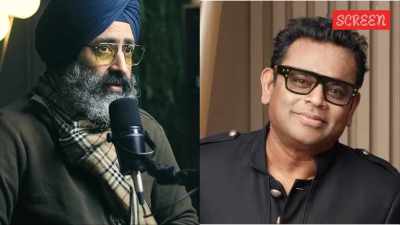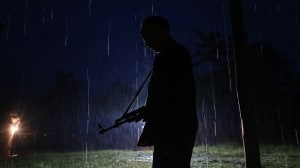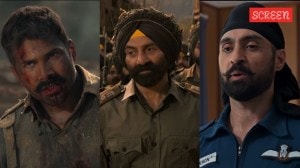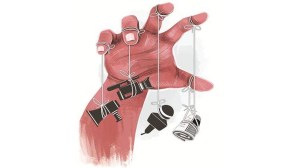A general unease
A wedding took me to Lahore a few days ago. This was my first visit to Pakistan after 14 months. The last time I was on Prime Minister Vaj...

A wedding took me to Lahore a few days ago. This was my first visit to Pakistan after 14 months. The last time I was on Prime Minister Vajpayee friendship bus to Lahore. It was then an enthusiastic welcome all the way. This time I flew and stood in a long queue.
Indeed, the atmosphere has changed since my last trip. For one, there was the Kargil intrusion. Secondly, the military is in power. I found people pre-occupied, if not tense. They prefer to exchange mere pleasantries. They would be happier not to say anything on the situation in Pakistan. Most of them are afraid and look around before they utter a few words.
Still I asked everyone I met: Why Kargil? They were quiet. All that I heard by the way of explanation was that Nawaz Sharif was a party to it. What they tried to convey was that the sympathy which the Indians had expressed for him was misplaced. Why was the Lahore process disturbed? Some intellectuals had the answer: Pakistan was not ready for it. The nation was suddenly asked to switch off the anti-India feeling it had nourished for years. This was not possible overnight. Many made the same point that former Prime Minister, Inder Gujral, did: the breakthrough in India-Pakistan relations will not be an event, it will be the result of an evolvement.
Strange, Vajpayee8217;s speech at Lahore that Pakistan did not require India8217;s ratification for its entity was not recalled by anyone. Nor were his words that India8217;s integrity was dependent on the integrity of Pakistan. It was all written on water, washed away when the military took over, or even earlier. In Pakistan, you have to start from the beginning every time.
People have not liked the coupthe fourth in the last 40 years. But they do not appear to be losing sleep over it. They have learnt over the years how to step from one regime into another, from a democratic to a military one. When there is an elected government, they make all the noise and criticism. But with the arrival of the khaki, they get into endless rationalisations. No intellectual speaks out in public, no political worker courts arrest and no journalist criticises the military dictator by name. Political activity has come to a halt.
People do not regret the exit of Sharif or Benazir Bhutto. They were both found corrupt. But they have come to value their vote. This is what they miss. Even the most optimist among them does not expect the political process to begin in the next two, three years. General Zia-ul-Haq promised to hold elections within 90 days but stayed on for 11 years.
Yet the armed forces are seldom out of favour. One, it is the only organised, disciplined group in an otherwise politically and socially chaotic country. Two, the perpetual fear of India makes the society there accept the military for security. Even otherwise, it has come to be recognised as the third chamber. The behaviour of the armed forces is not questioned, although discussed in whispers. No civil servant likes their surveillance. No intellectual accepts the straitjacket. No politician is happy with inactivity. Still people can do nothing about the situation.
There is no doubt that Sharif knew about the Kargil intrusion when he met Vajpayee at Lahore. But the latter8217;s anxiety to find a solution to Kashmir even the time framework was decided in Lahore made Sharif realise that he had an opportunity to break away from the past. He wanted to avail himself of the chance. He went to Beijing to have its understanding, if not support.
Returning empty-handed, he wanted to break journey at New Delhi to meet Vajpayee. India did not consider Sharif8217;s presence politic when a fierce battle was raging at Kargil. He went to Washington. The rest is history.The thinking of the military is reflected in the reported suggestion General Pervez Musharraf made before accompanying Sharif to Washington. He advised Sharif to bring in his brother Shahbaz Sharif, then the Punjab chief minister, to the Centre to 8220;strengthen8221; his hands. Shahbaz was visibly unhappy over the Lahore process and Mu-sharraf knew about it. It was Abbaji the father of Nawaz and Shahbaz, who turned down the proposal. Otherwise, Nawaz was sought to be replaced by Shahbaz.
After talking to several persons in Lahore and Islamabad it does not take long to find out how the coup took place. The Corps Commanders, who had not liked the manner in which then Chief of Army Staff Jehangir Karamat was eased out, assured Musharraf that they would stand by him if he was ever dismissed. They carried out their promise when he returned from Colo-mbo.
But what they endorsed in the pro-cess was the Kargil intrusion, which Mu-sharraf had planned and executed. Sharif was quite right when he said in a Karachi law court that he was punished for the agreement over Kargil.Pakistanis have, however, been taken aback by the strong reaction in India on Kargil. For them, it was just another battle, not a war. They are surprised at India tak ing so much umbrage that it refused to have talks with Pakistan. They would have liked to resume a dialogue because, in its absence, they fear a limited war. New De-lhi, according to them, is preparing to hit Pakistan 8220;somewhere8221;. 8220;Limited war is not in India8217;s hands,8221; Pakistan8217;s Foreign Minister Abdul Sattar told me at Islamab-ad in his office. 8220;Once it starts, nobody can say for certain how it will spread or end.8221; He did not refer to the bomb during his two-hour conversation. But many others, who talked about a limited war, said that it was bound to lead to nuclear warfare.
Lately, Musharraf has begun making a distinction between action in Kashmir and other places. The first, he argues, is a jihad holy war, the second is mere confrontation. On Kashmir, with or without jihad, he has the support of the general public. In a country divided into Punjabis, Sindhis, Baluchis, Pathans and Mohajirs, Kas-hmir provides a common cause. I fo-und, both in Lahore and Islamabad, sever-al hoardings and recruitment camps for people to join the jihad in Kashmir. Life size portraits of some Hurriyat leaders ha- ve been displayed at a few crossings with slogans like 8220;India should stop atrocities in Kashmir8221;. The country8217;s economy is still in bad shape. The prices of the basic necessities are higher than that in India. Foreign investment is practically nil.
But this does not mean that the country is collapsing. External debts have been rescheduled for this year and the same exercise is afoot for the next year. There is no political stir and the MQM in Karachi is quiet. The discordant note in an otherwise well-orchestrated scenario is the disillusionment which is spreading. Musharraf has done little to sustain people8217;s hopes that the armed forces will better their economic conditions. Even the law and order situation has not changed much.
What does the military do to cover up its non-performance? Another Kargil to divert the people8217;s attention perhaps. The only danger, as Sattar himself pointed out, is that there is no way to limit a war once hostilities break out.
- 01
- 02
- 03
- 04
- 05































